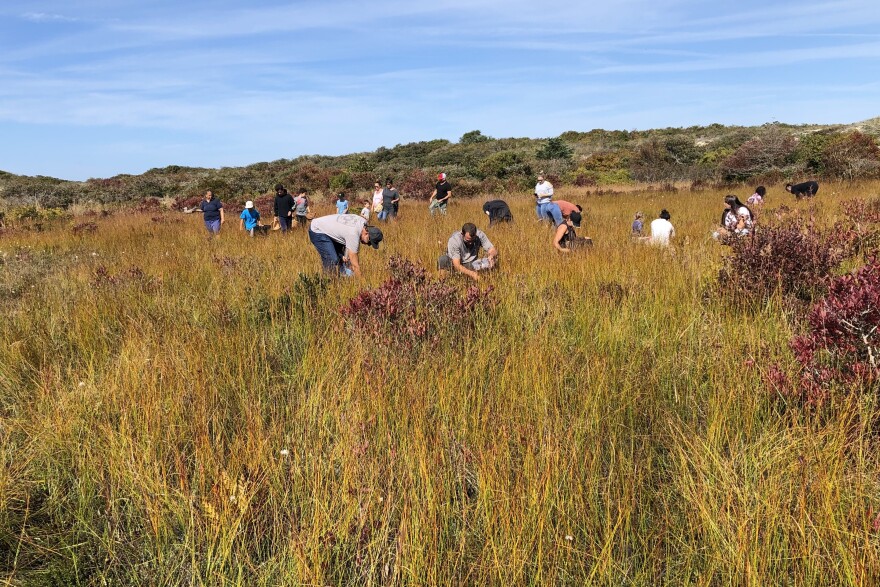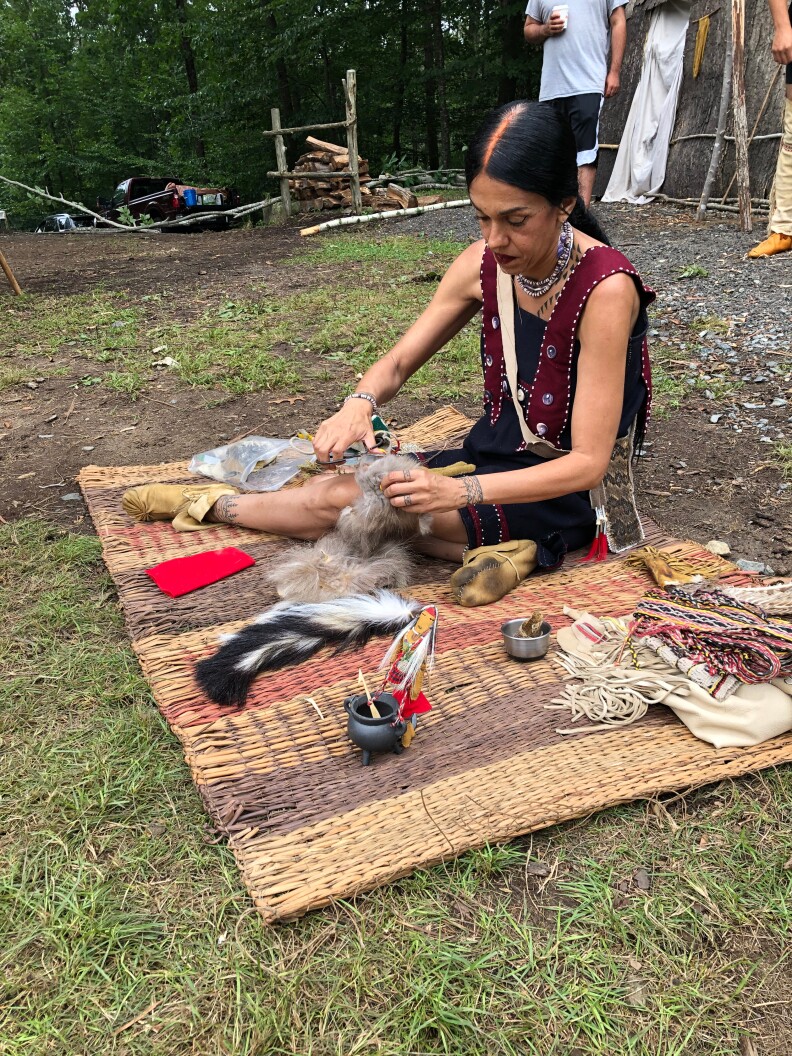Congress has cut federal funding for public media — a $3.4 million loss for LAist. We count on readers like you to protect our nonprofit newsroom. Become a monthly member and sustain local journalism.
Thanksgiving is a year-round practice of giving thanks

When the Pilgrims sat down to what some regard as the first Thanksgiving 400 years ago in what is today Plymouth, Mass., they hardly had the market cornered on giving thanks. For local Wampanoags, and Indigenous people throughout North America, gathering to give thanks was already a familiar custom, taking place not just annually, but 13 times throughout the lunar, calendar year — a cycle known as the Thirteen Moons or Thirteen Thanksgivings.
"Thanksgivings are a big part of our culture. Giving thanks is how we pray," says Kerri Helme, a Mashpee Wampanoag whose tribal ancestors were the first to engage with Plymouth's Pilgrims when they arrived. These cyclical celebrations welcome the summer's first strawberries, the first green beans, the tapping of maple trees, the month of storytelling during the depths of winter, and more.
Schemitzun, also known as the Green Corn Festival, is a celebration of the corn harvest at the end of August.

"We view Green Corn as a homecoming. It's really an opportunity for everyone to see each other," says Helme, who celebrated Schemitzun at Mashantucket in southeastern Connecticut, home to the Mashantucket (Western) Pequot Tribal Nation. The two-day festival of dancing, chanting, and feasting is one of the largest Indigenous gatherings, or pow wows, in the Northeast.
In October, after the corn fields have browned and withered, Aquinnah Wampanoags on the island of Martha's Vineyard turn their attention to gathering wild cranberries during Cranberry Thanksgiving, a day, like Schemitzun, of ceremony, feasting and song.
Young and old fan out across tribal bogs to gather the tart, crimson berries. While they appear at least annually on many American dinner tables, tribal elder Julianne Vanderhoop says the Aquinnah cherish cranberries throughout the winter as a source of nutrition.
"Cranberries were mixed into everything, from fritters to vegetables. They're dried and held in the root cellar over the winter. So this was a primary sustenance crop for us" says Vanderhoop.
So sacred is Cranberry Thanksgiving that Aquinnah children are officially given the day off from school to join the harvest.
Come November, when temperatures drop, the focus shifts from harvesting to hunting during Hunters Moon, the next celebration in the cycle.
"That moon is an important time for us," says Cassius Spears Jr. first councilman of the Narragansett tribe in Rhode Island.
"We talk to the four leggeds and we ask for them to help us get through the winter and that's when we go out and we hunt. That's a time of thanks, a time of appreciation because [animals] are giving their lives so we can live," says Spears.

But in recent decades wildlife, habitat and the cycle of the Thirteen Moons themselves face threats, Spears says, from climate change.
"If the strawberries aren't growing, how are you going to have a strawberry thanksgiving? If the green corn is stunted because of drought and it's not ready for harvest, or the quantity isn't there at the end of the season, how are we able to do our ceremonies?" he asks.
In answer to his own questions, Spears says Indigenous people will find ways to endure, as they always have, just as day follows night.
"We give thanks every day when the sun rises, or the sun sets, we give thanks. So it's something that we do. It's a part of who we are, which is far, far removed from American Thanksgiving and football and turkey and getting mad at your family" he says, wryly.
Expressing gratitude thirteen times a year, Spears concludes, not only shows respect for the earth, but keeps Indigenous people in close touch with the cycles of creation's blessings.
Copyright 2021 NPR. To see more, visit https://www.npr.org. 9(MDA1OTI3MjQ5MDEyODUwMTE2MzM1YzNmZA004))
As Editor-in-Chief of our newsroom, I’m extremely proud of the work our top-notch journalists are doing here at LAist. We’re doing more hard-hitting watchdog journalism than ever before — powerful reporting on the economy, elections, climate and the homelessness crisis that is making a difference in your lives. At the same time, it’s never been more difficult to maintain a paywall-free, independent news source that informs, inspires, and engages everyone.
Simply put, we cannot do this essential work without your help. Federal funding for public media has been clawed back by Congress and that means LAist has lost $3.4 million in federal funding over the next two years. So we’re asking for your help. LAist has been there for you and we’re asking you to be here for us.
We rely on donations from readers like you to stay independent, which keeps our nonprofit newsroom strong and accountable to you.
No matter where you stand on the political spectrum, press freedom is at the core of keeping our nation free and fair. And as the landscape of free press changes, LAist will remain a voice you know and trust, but the amount of reader support we receive will help determine how strong of a newsroom we are going forward to cover the important news from our community.
Please take action today to support your trusted source for local news with a donation that makes sense for your budget.
Thank you for your generous support and believing in independent news.

-
Isolated showers can still hit the L.A. area until Friday as remnants from the tropical storm move out.
-
First aspiring spectators must register online, then later in 2026 there will be a series of drawings.
-
It's thanks to Tropical Storm Mario, so also be ready for heat and humidity, and possibly thunder and lightning.
-
L.A. County investigators have launched a probe into allegations about Va Lecia Adams Kellum and people she hired at the L.A. Homeless Services Authority.
-
L.A. Mayor Karen Bass suspended a state law allowing duplexes, calling more housing unsafe. But in Altadena, L.A. County leaders say these projects could be key for rebuilding.
-
This measure on the Nov. 4, 2025, California ballot is part of a larger battle for control of the U.S. House of Representatives next year.





![A Black woman sits at a dais with a flag in the background. A name placard in front of her reads: Dr. Va Lecia Adams Kell[um].](https://scpr.brightspotcdn.com/dims4/default/5425437/2147483647/strip/true/crop/6298x3897+0+0/resize/640x396!/quality/90/?url=http%3A%2F%2Fscpr-brightspot.s3.us-west-2.amazonaws.com%2F76%2F00%2Febed9a7a4fbd9e5ba12997e51d59%2Fgettyimages-1258669633.jpg)

